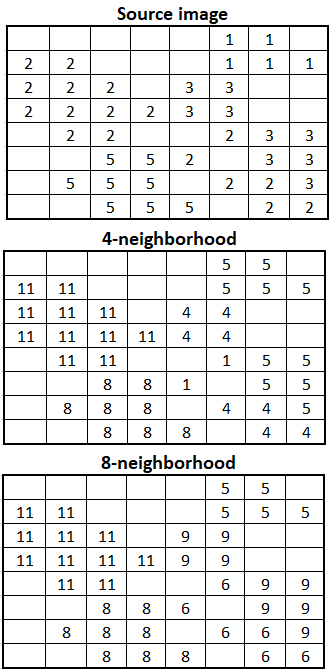The Region Pixel Count function identifies connected regions with the same pixel value and returns a raster containing values for the number of pixels in the regions.
Notes
The output from the function is a raster containing the number of interconnected pixels containing the same value.
This function can be used to reduce noise in change detection results.
This function can be used to identify smaller regions by setting the Maximum Region Size parameter. The result can be used to clean up noise. For example, it can be used to remove noisy regions in image classification or change detection workflows.
To get the size of larger regions—such as more than 10,000 pixels—use Region Group and Remap instead.
The Pixel Neighborhood value is a 4-neighborhood or 8-neighborhood that determines if an interconnected pixel belongs to a region. In the example below, the pixels in the source image are assigned to a region in the output raster, depending on the Pixel Neighborhood size.

Parameters
| Parameter | Description |
|---|---|
Raster | The input raster dataset. |
Maximum Region Size | The maximum number of pixels a region can contain. Pixels within regions larger than the Maximum Region Size value will be assigned a value of Maximum Region Size + 1. The default is 100. |
Pixel Neighborhood | The number of neighborhoods to be used when assessing pixel connectivity. The neighborhood can be a 4x4 window or an 8x8 window. The default is 4x4. |